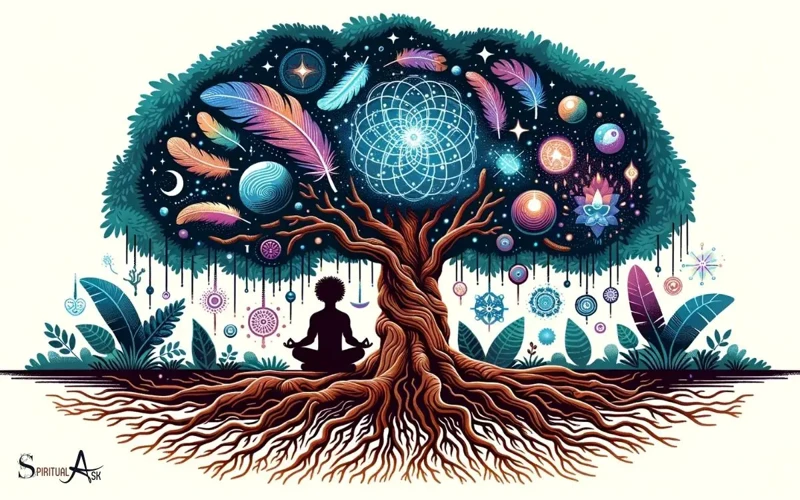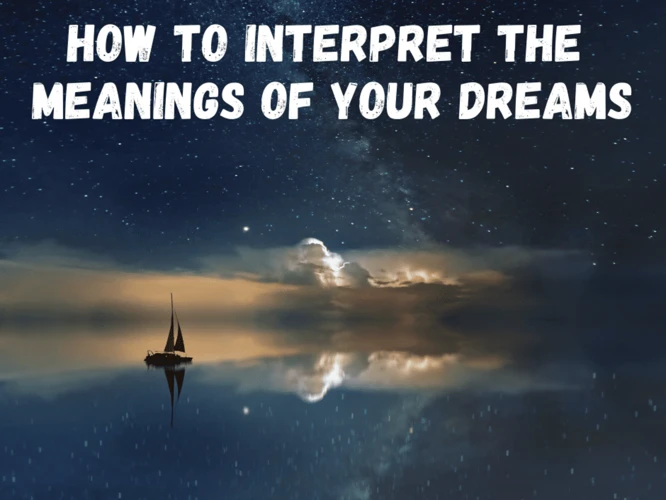Have you ever wondered about the power of words within the realm of dreams? Dreams have long been a fascinating and mysterious part of the human experience, often shrouded in symbolism and hidden meanings. In this article, we delve into the intricate role of words in dreams and explore how they can be interpreted to uncover deeper insights into our subconscious minds. From understanding dream symbolism to harnessing the influence of spiritual beliefs, we will uncover the ways in which words can shape and enhance our dream experiences. Join us on this intriguing journey of self-discovery as we unravel the secrets behind the power of words in the interpretation of dreams.
The Role of Words in Dreams

Words play a crucial role in the interpretation of dreams. They act as gateways into our subconscious minds, revealing hidden emotions, desires, and fears. When we dream, our minds often use words as a means of communication, albeit in a more symbolic and abstract form. Whether the words appear as spoken dialogue, written text, or even as signs and labels, they hold significant meaning in deciphering the messages from our dreams. Each word and phrase within a dream has the potential to unlock a deeper understanding of ourselves and our experiences. By analyzing the specific words used and their context within a dream, we can unravel the intricate layers of symbolism and gain valuable insights. From interpreting dream symbols to understanding the language of dreams, words serve as a powerful tool in unraveling the mysteries of our subconscious minds.
Understanding Dream Symbolism

Understanding dream symbolism is a key aspect of interpreting the messages hidden within our dreams. Dreams have a language of their own, often speaking to us through vivid imagery and symbolic representations. Each symbol holds a deeper meaning that goes beyond its literal interpretation. For example, dreaming about flying can signify a sense of freedom or empowerment, while dreaming about falling may reflect a fear of losing control. To truly grasp the significance of dream symbols, it is important to consider the individual’s personal experiences, beliefs, and emotions. A symbol that may hold a specific meaning to one person could have a completely different interpretation for another. By delving into the rich symbolism of our dreams and exploring the unique associations we have with certain images, we can unlock valuable insights into our subconscious minds. So the next time you find yourself pondering the meaning of a dream symbol, allow your intuition to guide you on a journey of self-discovery and interpretation.
The Language of Dreams
The language of dreams is a unique and enigmatic form of communication. In the realm of dreams, words take on layers of symbolism and meaning that may differ from their literal interpretation. Dreams often speak to us through metaphor, imagery, and wordplay, making it essential to understand the language they employ. Each element of a dream, including words, carries significance and can offer valuable insights into our subconscious thoughts and emotions. By deciphering the language of dreams, we gain a deeper understanding of ourselves and the messages our minds are trying to convey. Exploring the symbolism behind dream words opens up a world of self-discovery and personal growth. Each dream holds its own linguistic code waiting to be deciphered and understood. So, let’s dive into the intriguing language of dreams and unravel its mysteries.
Exploring Symbolic Interpretations
When delving into the realm of dream interpretation, it is essential to explore symbolic interpretations. Dreams often speak to us through a language of symbols, using objects, people, and scenarios to convey deeper meanings. By analyzing these symbols and their significance, we can gain a better understanding of the messages hidden within our dreams. For example, dreaming about flying can represent a sense of freedom and liberation, while dreaming about water may symbolize emotions and the unconscious mind. Each symbol holds unique interpretations that are personal to the dreamer. By examining the context and emotions associated with these symbols, we can unravel the rich tapestry of our dreams and uncover profound insights about ourselves and our subconscious minds.
The Influence of Spiritual Beliefs

Our spiritual beliefs can greatly influence the way we interpret dreams and understand the power of words within them. For many, dreams are seen as a sacred communication channel between the divine and ourselves. Words spoken or encountered in dreams are believed to hold profound spiritual significance, serving as manifestations of the divine presence. In some spiritual traditions, sacred texts provide guidance on dream interpretation, offering insights into the symbolic meanings of specific words and images. These texts can inspire individuals to explore the depths of their dreams, seeking wisdom and guidance from the spiritual realm. By incorporating our spiritual beliefs into our dream work, we can unlock a deeper understanding of the messages hidden within the words of our dreams and connect with the divine. (source: /dream-about-being-pregnant-and-giving-birth/)
Words as Manifestations of the Divine
In the realm of dreams, words can also be seen as manifestations of the divine. Many spiritual belief systems hold the belief that words have a sacred and powerful essence, capable of shaping reality and connecting us to higher realms of consciousness. In dreams, words can serve as direct messages from the divine, offering guidance, wisdom, and even prophecies. These words may come in the form of divine names, prayers, or sacred verses from religious scriptures. The interpretation of these words requires a deep understanding of the specific spiritual traditions and their associated symbolism. By recognizing the divine nature of words in dreams, we open ourselves to a deeper connection with the spiritual realm and the messages it seeks to convey. Whether it is a dream about cookies, a dream about vomiting, or any other symbolic imagery, every word holds the potential to unveil profound insights into our spiritual journey (link: /dream-about-cookies/).
Sacred Texts and Dream Interpretation
Sacred texts have long been revered as sources of wisdom and guidance across different spiritual traditions. These ancient texts often contain valuable insights into dream interpretation. Many religious scriptures, such as the Bible, the Quran, or the Hindu Vedas, mention dreams as a means of divine communication and provide examples of dreams being interpreted for prophetic or symbolic purposes. These texts serve as a rich resource for understanding the significance of dreams and the messages they convey. Exploring the interpretations of dreams within sacred texts can offer a deeper understanding of the spiritual dimensions of dream experiences. By studying the wisdom contained in these texts, individuals can gain valuable insights into their own dream symbolism and the hidden meanings behind them. Understanding the connections between sacred texts and dream interpretation allows for a more profound exploration of the power of words within the realm of dreams.
The Power of Affirmations and Mantras

Utilizing the power of affirmations and mantras can greatly enhance our dream experiences and promote positive subconscious programming. Affirmations are positive statements that we repeat to ourselves, either consciously or subconsciously, to instill a particular belief or mindset. Similarly, mantras are sacred words or phrases that hold spiritual significance and are chanted or recited for various purposes. When incorporated into our dream work, affirmations and mantras can have a profound impact on our dream content and overall mindset. By consciously incorporating positive words and intentions into our dreams, we can influence the narrative and themes that unfold during sleep. This practice can help us overcome fears, promote healing, and manifest desired outcomes. Whether it’s repeating affirmations before sleep or chanting mantras during a lucid dream, the power of words in dreamwork is a valuable tool for personal growth and transformation. Find out more about the connection between dreams and manifestation by exploring the meaning of vomiting in dreams.
Utilizing Positive Words in Dream Work
When it comes to dream work, utilizing positive words can have a profound impact on our dream experiences. Positive words have the ability to shift our mindset, evoke feelings of empowerment, and set a supportive tone for our dream journeys. By incorporating positive affirmations and mantras into our dream practice, we can harness the power of words to manifest our desires and intentions within the dream realm. Whether it’s repeating affirmations before bed, visualizing positive outcomes, or consciously using uplifting language within our dreams, these practices can enhance our dream experiences and promote a more positive and transformative dream state. The power of positive words in dream work lies in their ability to shape our perceptions, evoke positive emotions, and create a fertile ground for growth and self-discovery. Explore the wondrous possibilities that unfold when we harness the power of positive words in our dream journeys.
Channeling Energy Through Mantras
Mantras are powerful tools for channeling energy in dreamwork. These sacred words or phrases, when repeated during a dream, can enhance our connection to the dream experience and amplify the manifestation of our intentions. By choosing empowering and positive mantras, we can consciously direct the energy within our dreamscape. When we repeat these mantras within our dreams, we create a resonance that aligns our subconscious mind with our conscious desires. This alignment helps us gain greater control and focus within our dreams, allowing us to explore specific themes or aspects of ourselves that we wish to work on. Through the repetition of mantras, we tap into the vibrational frequency of the words and harness their transformative power in our dream state.
The Impact of Lucid Dreaming Techniques

Lucid dreaming techniques have a profound impact on our dream experiences, and words play a vital role in this practice. When we become aware that we are dreaming, we gain the ability to actively participate and shape the dream world. Words can be utilized to program and direct our dreams with intention. By consciously using specific words or phrases before falling asleep, we can set intentions for the dreams we want to have. This technique is known as dream programming. Additionally, when we find ourselves lucid in a dream, engaging in a dialogue with dream characters can provide valuable insights. By speaking and interacting with the dream characters, we can gain further clarity and understanding. This form of dream communication allows us to ask questions, seek guidance, and uncover hidden messages. Whether it’s through intentional dream programming or engaging in conversations within lucid dreams, words become a powerful tool in shaping and exploring our dream landscapes.
Programming Dreams with Intentional Words
In the realm of dream exploration, the use of intentional words holds remarkable potential. By consciously choosing and incorporating specific words into our thoughts and intentions before sleep, we can program our dreams to align with our desires and goals. This technique, known as dream programming, involves focusing on positive affirmations, visualizing desired outcomes, and using powerful keywords that resonate with our intentions. By repeated exposure to these intentional words, we create a bridge between our waking and dreaming minds, allowing for a greater influence over the content and experiences within our dreams. Whether seeking inspiration, problem-solving, or personal growth, programming dreams with intentional words can serve as a tool for manifesting desires and gaining deeper insights. So, explore the power of language in dream programming and unlock the incredible potential of intentional words in shaping our dream experiences.
Creating a Dialogue with Dream Characters
Creating a dialogue with dream characters is a fascinating aspect of dreamwork. When we engage in conversation with the characters that appear in our dreams, we open up the opportunity to gain deeper insights and understanding. By actively interacting with these dream figures, we can ask them questions, seek guidance, or simply listen to what they have to say. This dialogue can be done through spoken words, gestures, or even telepathic communication. As we engage in these conversations, it is important to pay attention to the words used by both ourselves and the dream characters. Their responses may hold invaluable wisdom and provide clues to uncovering the hidden messages within our dreams. By actively engaging in a dialogue with dream characters, we can foster a profound connection with our subconscious mind and gain a deeper understanding of ourselves and our dreams.
Language in Dream Journaling and Analysis

In the realm of dream journaling and analysis, language holds a significant role in decoding the messages and patterns within our dreams. By recording our dreams in detail and analyzing the language used, we can gain a deeper understanding of their meanings. One approach is to recognize patterns in dream language, where the repetition of certain words or phrases may indicate recurring themes and emotions. Additionally, the art of word association can be employed to uncover hidden connections and symbolism within our dreams. By exploring the relationships between words and their associated meanings, we can unravel the intricate layers of our subconscious minds. Dream journaling and analysis provide a space for us to analyze the words and language of our dreams, allowing us to tap into the profound wisdom and insights that they hold.
Recognizing Patterns in Dream Language
Recognizing patterns in dream language is a key aspect of understanding the deeper meanings behind our dreams. When analyzing our dreams, it is important to pay attention to recurring words, phrases, or symbols that appear across multiple dream experiences. These patterns can provide valuable insights into our subconscious thoughts and emotions. By keeping a dream journal and documenting the words and themes that frequently occur, we can begin to decode the unique language of our dreams. This process allows us to identify recurring symbols and themes, uncovering common threads that may represent unresolved issues or desires in our waking lives. By recognizing and analyzing these patterns in dream language, we can gain a deeper understanding of ourselves and work towards personal growth and introspection.
The Art of Word Association
The art of word association is a valuable technique in dream journaling and analysis. By exploring the connections and relationships between words that arise in our dreams, we can gain deeper insights into their underlying meanings. Word association involves examining the first word that comes to mind when we think of a particular dream symbol or theme. This process allows us to tap into our subconscious and explore the hidden connections our minds make. For example, if the dream involves a cat, we may associate it with words like independence, grace, or mystery. Analyzing these associations can provide a rich tapestry of meanings and enhance our understanding of the symbols present in our dreams. Through the art of word association, we can unlock the layers of symbolism and uncover the profound messages that our dreams hold.
Case Studies: Decoding Words in Dreams

In the realm of dream interpretation, case studies provide valuable insights into the process of decoding the words that appear in dreams. By analyzing the vocabulary and language used within the context of specific dreams, we can uncover hidden emotions, subconscious messages, and even patterns that may hold deeper meaning. For example, one case study involved a dream where the individual repeatedly saw the word “cookies.” Through exploration and analysis, it was discovered that the word “cookies” represented comfort and indulgence, reflecting the dreamer’s need for self-care and relaxation. Another case study involved a dream about vomiting, which upon decoding, revealed the dreamer’s subconscious release of negative emotions that had been repressed. These examples demonstrate how the interpretation of words in dreams can offer valuable insights into our innermost thoughts and feelings, allowing for self-discovery and personal growth.
Unlocking Hidden Emotions Through Vocabulary
Unlocking hidden emotions through vocabulary is a fascinating aspect of dream analysis. Our dreams often serve as a conduit for unexpressed emotions, allowing them to surface in symbolic forms. By paying close attention to the specific words and phrases used in our dreams, we can gain insight into the underlying emotions that may be influencing our waking lives. For example, if we dream about being chased, the words associated with this scenario can reveal feelings of fear, anxiety, or a sense of being overwhelmed. Similarly, if we dream about falling, the words used in the dream can indicate a lack of control or feelings of insecurity. By analyzing the vocabulary within our dreams, we can unlock the hidden emotions that are seeking our attention and work towards addressing and resolving them in our waking lives.
Unraveling Subconscious Messages
Unraveling subconscious messages is a key aspect of dream interpretation. Within our dreams, our subconscious mind often communicates with us through symbols, events, and yes, words. These words hold hidden meanings that can provide valuable insights into our deepest thoughts, emotions, and desires. By paying attention to the specific words that appear in our dreams, we can begin to unravel the messages that our subconscious is trying to convey. Each word has the potential to serve as a clue or a metaphor, guiding us towards a deeper understanding of ourselves. Through careful analysis and reflection, we can decipher the intricate language of our dreams and unlock the profound wisdom hidden within the words spoken by our subconscious mind. This process of unraveling subconscious messages is a journey of self-discovery and personal growth, leading us to greater insights and clarity in our waking lives.
The Significance of Silence in Dream Communication

Silence in dream communication holds a profound significance, often conveying messages and emotions where words fail. In dreams, silence can represent a variety of meanings, from repressed emotions to a need for introspection. It allows for a deeper level of understanding and connection with our subconscious minds. When words are absent or silenced in dreams, other forms of communication such as body language, gestures, or symbolic actions take center stage. Paying attention to these non-verbal cues can provide valuable insights into our dreams. Sometimes, silence can also serve as a reminder to listen and observe, allowing for a more receptive state of mind. Embracing the significance of silence within dream communication opens up a world of unspoken understanding and adds another layer of complexity to the interpretation of our dream experiences.
Enhancing Dreamwork with Sacred Sounds
Sacred sounds have long been recognized for their ability to enhance dreamwork and deepen our connection to the dream realm. The use of chants, singing, and vocalizations can serve as powerful tools to amplify the dream experience. When we incorporate sacred sounds into our dream practices, we create a sacred space where the vibrations of sound can resonate with our subconscious minds. Chanting, with its repetitive and rhythmic nature, can help to quiet the conscious mind and induce a state of relaxation and focus conducive to lucid dreaming. Singing can serve as a form of self-expression and catharsis, allowing us to release emotions and engage with dream imagery on a deeper level. Additionally, utilizing sound baths and binaural beats can create a sonic environment that promotes relaxation and a shift in consciousness, enhancing the overall quality of dreams. As we explore the power of sacred sounds in dreamwork, we open ourselves to a world of possibilities where the language of dreams and the vibration of sound intersect, guiding us on a transformative journey of self-discovery.
Chanting, Singing, and Vocalizations
Chanting, singing, and vocalizations hold a significant place in the realm of dream communication. When we engage in these forms of expression within our dreams, they can convey powerful messages and emotions. Chants and melodies have been used for centuries in various spiritual practices to invoke specific energies and create a deeper connection with the divine. In dreams, the act of chanting or singing can serve as a means of self-expression, healing, and spiritual connection. By paying attention to the words and melodies we hear or create in our dreams, we can tap into the profound wisdom and guidance that resides within us. These vocalizations have the potential to unlock hidden meanings and provide profound insights into our inner selves. As we explore the significance of chanting, singing, and vocalizations in dreamwork, we open ourselves up to a world where our voices become instruments of transformation and self-discovery.
Utilizing Sound Baths and Binaural Beats
Utilizing sound baths and binaural beats can greatly enhance our dream work and exploration. Sound baths involve immersing ourselves in soothing and resonant sounds, which can help relax the mind and facilitate a deeper state of dream consciousness. These sessions often utilize instruments like crystal bowls, gongs, or chimes, producing calming vibrations that can induce a more peaceful and receptive dream state. Binaural beats, on the other hand, utilize specific audio frequencies played through headphones to stimulate brainwaves associated with dreaming and deep relaxation. By listening to carefully crafted binaural beats during sleep or before bed, we can entrain our brainwaves to align with the desired states conducive to lucid dreaming, dream recall, or even specific dream themes. These powerful sound-based techniques can create a harmonious environment for dream exploration, allowing us to tap into the transformative power of words within our dreamscape.
Conclusion
In conclusion, the power of words in dreams is truly remarkable. They act as bridges between the conscious and subconscious realms, allowing us to explore and understand the intricate landscapes of our minds. Through the interpretation of dream symbolism and the utilization of positive affirmations and mantras, we can harness the transformative potential of words in our dream work. Lucid dreaming techniques enable us to consciously program our dreams with intentional words, creating a dialogue with dream characters and unlocking hidden messages. By incorporating language in dream journaling and analysis, we can recognize patterns and uncover deeper meanings. Words hold a significant role in decoding emotions, unraveling subconscious messages, and establishing a profound connection with ourselves. Additionally, the significance of silence and the enhancement of dreamwork through sacred sounds further demonstrate the multifaceted nature of communication within dreams. So embrace the power of words in your dream exploration and unlock the profound wisdom that lies within your sleeping mind.
Frequently Asked Questions
Can dream words be taken literally?
Dream words should not be taken literally as they often carry symbolic meanings. They serve as representations of deeper emotions and experiences within our subconscious minds.
How can I start interpreting dream symbolism?
To interpret dream symbolism, it is helpful to keep a dream journal and write down the words and symbols that appear in your dreams. Look for patterns, emotions, and personal associations to begin understanding their significance.
Can different people have different interpretations of the same dream word?
Absolutely! Dream interpretation is highly subjective, and different individuals may have varying interpretations of the same dream word based on their personal experiences, beliefs, and subconscious associations.
Are there universal symbols in dream language?
While there are some symbols that may have more universal meanings, such as water representing emotions or a snake symbolizing transformation, it is crucial to consider personal context and associations in dream interpretation.
Does dream symbolism change over time?
Dream symbolism can be influenced by personal growth, experiences, and cultural context. Symbols and their meanings can evolve and change as you gain new perspectives and insights throughout your life.
What role do affirmations and mantras play in dreams?
Affirmations and mantras can be used in dream work to channel positive energy and manifest desired outcomes. By using specific words and phrases, you can program your dreams to align with your intentions.
Can lucid dreaming enhance the impact of words in dreams?
Absolutely! Lucid dreaming allows you to consciously control and direct your dreams. By using intentional words and focusing on specific dream scenarios, you can amplify the impact and influence of words in your dreams.
How can dream journaling help analyze words in dreams?
Dream journaling involves writing down your dreams in detail, including the words that appear. By analyzing patterns, recurring words, and the emotions and associations connected to them, you can gain insights into the messages your subconscious mind is trying to convey.
Can decoding words in dreams help uncover hidden emotions?
Yes, decoding words in dreams can provide valuable clues to uncovering hidden emotions and desires that may have been buried in your subconscious. By examining the words and their connections to your waking life, you can gain a deeper understanding of your emotional landscape.
How does silence play a role in dream communication?
Silence in dreams can be significant and carries its own form of communication. It may represent unspoken emotions, repressed thoughts, or the need to listen and observe before taking action or expressing oneself.







